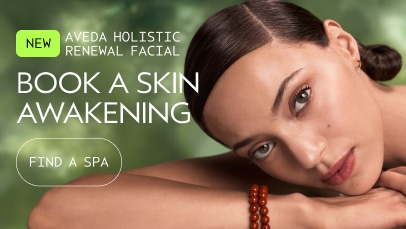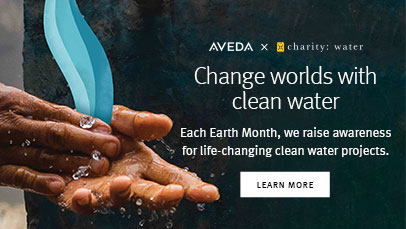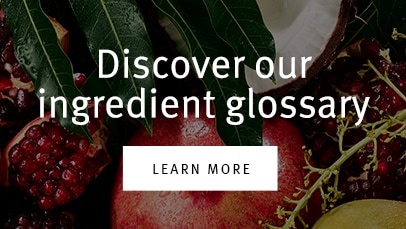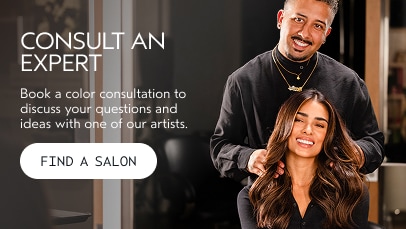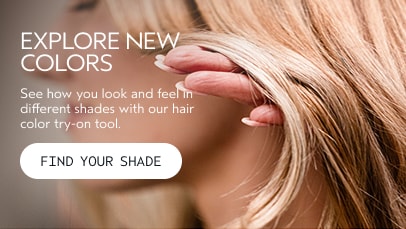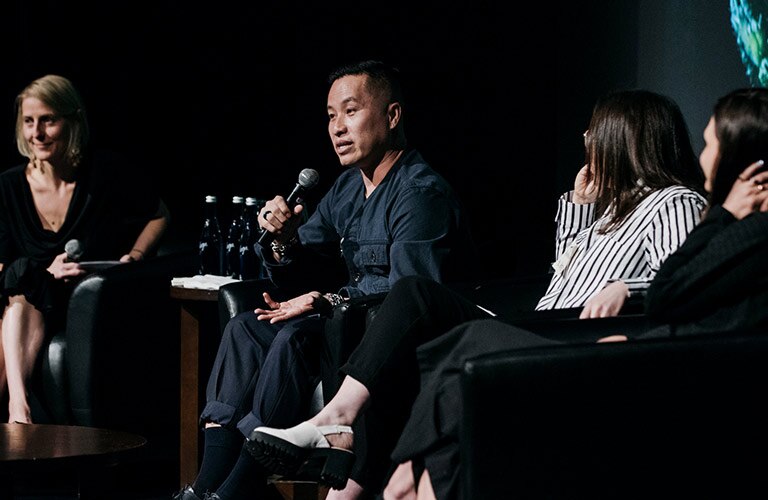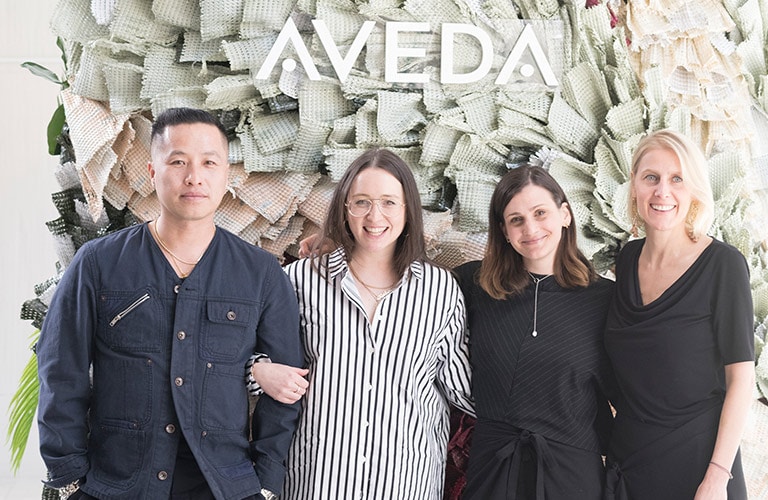Earth Month has officially begun, and to celebrate the beginning of our favorite month, we partnered with FIT (Fashion Institute of Technology) for their 13th Annual Sustainable Business and Design Conference: Innovation in Sustainability. We installed a gorgeous, immersive installation made with 14,000 upcycled Aveda bottles and tubes, and hosted a panel alongside our brand partners: Phillip Lim, charity: water and 1 Hotels. Our SVP/Global General Manager Barbara De Laere moderated the panel and discussed Aveda’s commitment to sustainability.
“This is the first time Aveda is sponsoring the FIT Sustainability Conference. It feels like a natural fit — it’s a match made in heaven,” she said. “This is where it’s happening. This is where the future of fashion and beauty is being created. Hundreds of students will get together with these opinion leaders and beautiful brands, working, learning and inspiring each other to make a more sustainable world for the future.”
“Nothing gets me more energized than to be able to join that conversation with those people and organizations who work hard every day to make the world a better place.” And we did just that with these amazing global changemakers! Read on for a few highlights from our panel discussion about innovation and the future of sustainability in four different fields: beauty, fashion, hospitality and nonprofit charity work.
On the panel:
Phillip Lim, co-founder and creative director of 3.1 Phillip Lim
Lauren Letta, COO of charity: water
Hannah Bronfman, Director of Sustainability and Impact for SH Hotels & Resorts (1 Hotels)
What was one surprising innovation in your industry that you wouldn’t have thought was possible 10 years ago?
Barbara: We’re very proud of our packaging at Aveda. We pioneered use of 100% post-consumer recycled plastic in the beauty industry and have won multiple awards. The other day, our head of packaging came into my office and said, “We’re looking into new opportunities … using cow waste for packaging.”
Phillip: I always think of a simple, humble way to start right. What’s fun right now is that we’re working with a third generation, family-owned denim mill from Guatemala. They create new denim out of recycled off-cuts that they gather from around the world. Through their processing into new recycled denim, they create waste, and they pass it on to specialized coffee growers in Guatemala. Maybe the next drink you have is part of this chain!
Hannah, like Aveda, 1 Hotels is driven by a mission of sustainability. For us, we know that this means we will inherently encounter some barriers for example, increased costs or a need to change suppliers because their values no longer meet our own. Since launching 1 Hotels Miami in 2015, what are some of the challenges that you have faced?
One of the things we did with our brand pillars, we created one that says “Everyone is evolving.” Things can’t stay static … things are going to change. We started in 2015 with one mattress, the most sustainable mattress on the market, and everyone is copying it now. On the larger level, the thing that gets me going is that our developers are changing their development models. It’s so cool to see how they’re putting an extra $1 million [in their budget] to evaluate solar, to work with this provider … I’ve seen the shift and seen the gears move.”
Lauren, charity: water has pledged to increase transparency and sustainability across the water sector and you have really pioneered the use of technology in that space. Can you explain why transparency is so important to the charity: water business model and how your partnership with Google came about?
When we started, people didn’t trust charity. Our founder wanted to change that and promise that 100% would go straight to the field. The simplest way to show [that] was to track every single dollar to the individual water project with a tracker, stick it on a well anywhere in the world and put it on Google Maps. The first thing we did was put our first project on Google Maps and sent everybody where their $20 went — the well that was made possible and the people drinking clean water. From then on, we’ve put every project on Google Maps. More than 33,000 all over the world, you can see them on our site and Google Maps.
Luxury and sustainability were once thought of as polar opposites, but it’s clear that this is changing. Can you describe the shift you’ve witnessed in consumers in their demand for an ethical alternative to their everyday needs?
Phillip: Luxury is a choice. We all have a choice and that’s the ultimate luxury. It’s our choice the company we keep, the brands we affiliate with … there’s no other luxury except choice. Luxury, freedom and choice and sustainability go hand in hand. Our choice is to choose sustainability. Our choice is to move forward in a more conscious way. Our choice is to be here together to empower each other.
What we do is not for everybody. It’s for people who choose it. We choose not to have the power of insane volume. What we choose to do is to honor what we work with and to make sure we use creativity, design and intention to make it last. When things last and they’re made of quality materials, they cost more. Why? Because of materials, and because of living wage. That also has to be sustainable, because you want to share a way of living with people. Next time you make a choice, choose truly sustainable for all and bring everyone along.
In terms of sustainability, where do you see yourself -- and your brand -- in 10 years?
Phillip: Our goal is sustainable balance. In 10 years, I hope we achieve that.
Hannah: In 10 years, my goal is learning more about translation. How the translation of this brand works in different communities, ecosystems, areas of human history. How do we create a space that celebrates the community but is open to how they do things?
Lauren: The words translation and balance were really powerful to me. What you’re seeing is that we haven’t figured it all out, but we’re willing to work on it. We’re never going to fix it, but what can we do? It’s intimidating to do this work because the problems are so big. At charity: water, our work is measurable, but it’s not going to be easy. As we think to the future, [we hope that] by 2030 every person on the planet will be drinking clean water. It requires more than a hope and dream — it requires the entire world committing to do that. It’s not just about clean water, it’s about sustainable clean water.
We want to go faster, reach more people, serve another 25 million people, solve the harder part and keep the water flowing – and get that adopted globally.
What’s your tip or trick for sustainability?
Phillip: Just start. Just start where you are. Where the intimidation happens is we’re expected to be experts, but we’re never going to be experts. Our job along the way is to stay curious, to take steps forward. It all adds up. Small gestures add up to a grand shift.
Hannah: The concept of resiliency is a good start. We’ve built strong walls, but we’ve learned that water will break that down. Let’s build soft edges, flex with the forces that come with it. When something shocking happens, you follow the tides and go along with it. You have to get the people around you to remind you that we don’t want to be strong and hard, we want to be soft and flexible.
Lauren: It’s OK to challenge the status quo. It’s OK to look at something that’s hard to look at. Now more than ever we get to ask questions and look at things through a new lens. Pick a focus. Know “This is what’s important to us.” That gives you an authenticity that can grow and guide you to make decisions about what you do. It’s important for brands to pick where they’re going to make an impact in the world.
